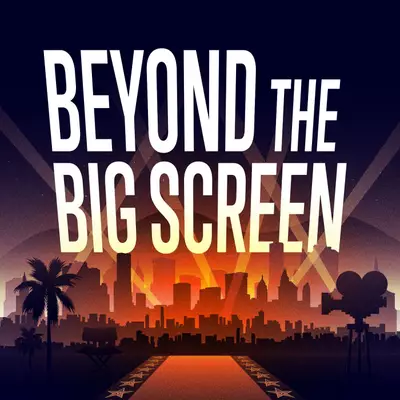Listen on Your Favorite App
Blade Runner (1982) – Reinventing Science Fiction
January 17, 2022
00:00
51:29
Listen on Your Favorite App
Title: Blade Runner (1982) – Reinventing Science Fiction
Description: Today we are joined by our frequent guest, Erik Fogg of the Reconsidered Podcast to talk about a trailblazing piece of science fiction, 1982’s Blade Runner starring Harrison Ford, Rutger Hauer and More. This film reimagined and reinterpreted Philip K. Dick’s classic novel “Do Androids Dream of Electric Sheep?” Although the movie is 40 years old, it is more relevant today than it was in the early 1980s.
Learn More About our Guest:
Erik Fogg of the Reconsider Podcast
www.reconsidermedia.org
You can learn more about Beyond the Big Screen and subscribe at all these great places:
www.beyondthebigscreen.com
Click to Subscribe:
https://www.spreaker.com/show/4926576/episodes/feed
email: steve@atozhistorypage.com
www.beyondthebigscreen.com
https://www.patreon.com/historyofthepapacy
Parthenon Podcast Network Home:
parthenonpodcast.com
On Social Media:
https://www.facebook.com/groups/atozhistorypage
https://www.facebook.com/HistoryOfThePapacyPodcast
https://twitter.com/atozhistory
Music Provided by:
"Crossing the Chasm" Kevin MacLeod (incompetech.com)
Licensed under Creative Commons: By Attribution 3.0 License
http://creativecommons.org/licenses/by/3.0/
Image Credits:
By IMP Awards, Fair use, https://en.wikipedia.org/w/index.php?curid=59925545
Begin Transcript:
, [00:00:00] this is beyond the big screen podcast with your host, Steve Guerra. Welcome today. We are going to talk about the 1982 movie blade runner based on the Phillip K Dick novel, do Androids dream of electric sheep. The book and the film are set in a near future. Post-apocalyptic dystopia. One of my favorite genres as is common with the dystopian science fiction, John.
Blade runner addresses a number of political and political science issues, political theory, and even philosophy are important for our frameworks while blade runner is not overtly political, it does tie deeply into questions of humanist and theological philosophy and to morality as well. Ultimately, all of this is critical for us deciding on what [00:01:00] political action, which is just our own moral, personal, moral action on collective scale to take.
It's why it's fascinated Eric for so long, and I'm very happy to be joined by Eric and Zander hosts of reconsider podcasts. Thank you guys so much for coming on today. We are happy to be here. Thanks for having us. Reconsider is actually a political podcast. Eric and Zane. Help you contextualize current politics and history and broader forces and political theory reconsider helps you rise above the one-liners the 140 character politics and tribal narratives.
Their motto is we don't do the thinking for you. And they really don't. That's why it's such an amazing podcast and one of my personal favorites. Thanks. But before we dig in too deeply, the. Here's some production details. We watched the final cut, which is the director's edition. Eric, you had commented on that.
Why do you think [00:02:00] that that's a better cut of the film than it? It went through several evolutions. Yeah, it actually went through four there's the theatrical cut. The international cut. The director's cut. And the final cut. The final cut being the one that really Scott. Like the best. And I have strong opinions on this and I think most other diehard blade runner fans do, there's a consensus generally that the final cuts the right one, not only because really Scott liked it best.
Uh, I don't know if Philip K Dick liked it best, but the reason we like it best is that the theatrical cut, um, has a number of, uh, sins. The biggest of which is the ending. The second biggest of which is the fact that. Um, Harrison Ford does a monologue. It does it like a backwards memory monologue. Like a lot of new are like, ah, she walked in and was the most beautiful woman I'd ever seen lights up to hair kind of thing.
And unfortunately what that does is it not only sounds [00:03:00] stupid in the context of what is otherwise a beautiful. Uh, but it also takes
Description: Today we are joined by our frequent guest, Erik Fogg of the Reconsidered Podcast to talk about a trailblazing piece of science fiction, 1982’s Blade Runner starring Harrison Ford, Rutger Hauer and More. This film reimagined and reinterpreted Philip K. Dick’s classic novel “Do Androids Dream of Electric Sheep?” Although the movie is 40 years old, it is more relevant today than it was in the early 1980s.
Learn More About our Guest:
Erik Fogg of the Reconsider Podcast
www.reconsidermedia.org
You can learn more about Beyond the Big Screen and subscribe at all these great places:
www.beyondthebigscreen.com
Click to Subscribe:
https://www.spreaker.com/show/4926576/episodes/feed
email: steve@atozhistorypage.com
www.beyondthebigscreen.com
https://www.patreon.com/historyofthepapacy
Parthenon Podcast Network Home:
parthenonpodcast.com
On Social Media:
https://www.facebook.com/groups/atozhistorypage
https://www.facebook.com/HistoryOfThePapacyPodcast
https://twitter.com/atozhistory
Music Provided by:
"Crossing the Chasm" Kevin MacLeod (incompetech.com)
Licensed under Creative Commons: By Attribution 3.0 License
http://creativecommons.org/licenses/by/3.0/
Image Credits:
By IMP Awards, Fair use, https://en.wikipedia.org/w/index.php?curid=59925545
Begin Transcript:
, [00:00:00] this is beyond the big screen podcast with your host, Steve Guerra. Welcome today. We are going to talk about the 1982 movie blade runner based on the Phillip K Dick novel, do Androids dream of electric sheep. The book and the film are set in a near future. Post-apocalyptic dystopia. One of my favorite genres as is common with the dystopian science fiction, John.
Blade runner addresses a number of political and political science issues, political theory, and even philosophy are important for our frameworks while blade runner is not overtly political, it does tie deeply into questions of humanist and theological philosophy and to morality as well. Ultimately, all of this is critical for us deciding on what [00:01:00] political action, which is just our own moral, personal, moral action on collective scale to take.
It's why it's fascinated Eric for so long, and I'm very happy to be joined by Eric and Zander hosts of reconsider podcasts. Thank you guys so much for coming on today. We are happy to be here. Thanks for having us. Reconsider is actually a political podcast. Eric and Zane. Help you contextualize current politics and history and broader forces and political theory reconsider helps you rise above the one-liners the 140 character politics and tribal narratives.
Their motto is we don't do the thinking for you. And they really don't. That's why it's such an amazing podcast and one of my personal favorites. Thanks. But before we dig in too deeply, the. Here's some production details. We watched the final cut, which is the director's edition. Eric, you had commented on that.
Why do you think [00:02:00] that that's a better cut of the film than it? It went through several evolutions. Yeah, it actually went through four there's the theatrical cut. The international cut. The director's cut. And the final cut. The final cut being the one that really Scott. Like the best. And I have strong opinions on this and I think most other diehard blade runner fans do, there's a consensus generally that the final cuts the right one, not only because really Scott liked it best.
Uh, I don't know if Philip K Dick liked it best, but the reason we like it best is that the theatrical cut, um, has a number of, uh, sins. The biggest of which is the ending. The second biggest of which is the fact that. Um, Harrison Ford does a monologue. It does it like a backwards memory monologue. Like a lot of new are like, ah, she walked in and was the most beautiful woman I'd ever seen lights up to hair kind of thing.
And unfortunately what that does is it not only sounds [00:03:00] stupid in the context of what is otherwise a beautiful. Uh, but it also takes
More Episodes
See all episodes
Meet Your Host

Steve Guerra is a historian and podcaster who hosts three different shows. He started with the History of the Papacy Podcast in 2013. In 2017, Steve began Beyond the Big Screen, a podcast that delves into the fascinating stories behind films through lively interviews. His newest show, Organized Crime and Punishment, takes a deep dive into the roots, evolution, and impact of organized crime across different cultures and countries.
